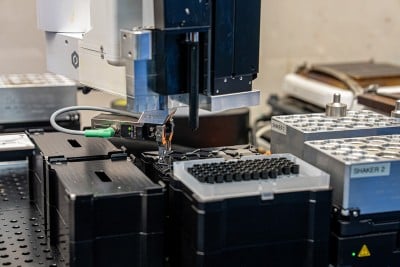Science
Berkeley Lab Unveils Automated Platform for Material Fabrication

A research team led by the Lawrence Berkeley National Laboratory has developed and successfully demonstrated an innovative automated experimentation platform aimed at optimizing the fabrication of advanced materials. This cutting-edge technology promises to enhance efficiency and precision in material development, which is crucial for various industries, including electronics, energy, and manufacturing.
The platform streamlines the experimentation process, significantly reducing the time required to produce and test new materials. By automating the procedures, researchers can quickly iterate on designs and refine material properties, allowing for faster advancements in technology. This breakthrough comes from the collaborative efforts within the Department of Energy and highlights the importance of automation in scientific research.
Enhancing Material Development Efficiency
The automated platform operates through a series of integrated machines that handle everything from the synthesis of materials to their characterization. This not only minimizes human error but also accelerates the process of discovering new materials with desired properties. According to the research team, the automation enables rapid feedback loops, where data from experiments can be analyzed in real time to inform subsequent tests.
One of the standout features of this platform is its scalability. Researchers can adjust the parameters of the experiments easily, allowing for a wide range of materials to be explored without significant downtime. This flexibility is crucial as the demand for advanced materials continues to grow, driven by innovations in technology and sustainability efforts across multiple sectors.
Potential Impacts on Various Industries
The implications of this automated experimentation platform extend far beyond the laboratory. Industries reliant on advanced materials, such as renewable energy and electronics, are poised to benefit significantly. For example, faster development of high-performance batteries and semiconductors could lead to improved energy efficiency and reduced costs for consumers.
Moreover, the ability to quickly optimize material properties can aid in the development of sustainable alternatives to traditional materials. As global demand for environmentally friendly solutions rises, this technology places researchers at the forefront of material science innovation.
The team at Berkeley Lab is optimistic about the future applications of their platform. As they continue to refine and expand its capabilities, they anticipate that it will play a pivotal role in addressing some of the most pressing challenges in materials science and engineering.
In conclusion, the automated experimentation platform developed by the Lawrence Berkeley National Laboratory marks a significant advancement in the field of materials fabrication. By enhancing efficiency and precision, this technology not only accelerates the research process but also holds the potential to revolutionize industries relying on advanced materials.
-

 Lifestyle3 months ago
Lifestyle3 months agoLibraries Challenge Rising E-Book Costs Amid Growing Demand
-

 Sports3 months ago
Sports3 months agoTyreek Hill Responds to Tua Tagovailoa’s Comments on Team Dynamics
-

 Sports3 months ago
Sports3 months agoLiverpool Secures Agreement to Sign Young Striker Will Wright
-

 Lifestyle3 months ago
Lifestyle3 months agoSave Your Split Tomatoes: Expert Tips for Gardeners
-

 Lifestyle3 months ago
Lifestyle3 months agoPrincess Beatrice’s Daughter Athena Joins Siblings at London Parade
-

 World3 months ago
World3 months agoWinter Storms Lash New South Wales with Snow, Flood Risks
-

 Science4 months ago
Science4 months agoTrump Administration Moves to Repeal Key Climate Regulation
-

 Science2 months ago
Science2 months agoSan Francisco Hosts Unique Contest to Identify “Performative Males”
-

 Business3 months ago
Business3 months agoSoFi Technologies Shares Slip 2% Following Insider Stock Sale
-

 Science4 months ago
Science4 months agoNew Tool Reveals Link Between Horse Coat Condition and Parasites
-

 Sports3 months ago
Sports3 months agoElon Musk Sculpture Travels From Utah to Yosemite National Park
-

 Science4 months ago
Science4 months agoNew Study Confirms Humans Transported Stonehenge Bluestones









